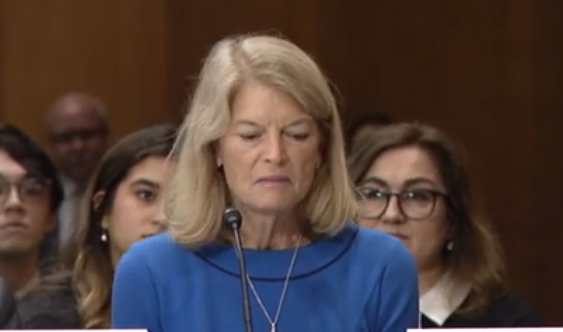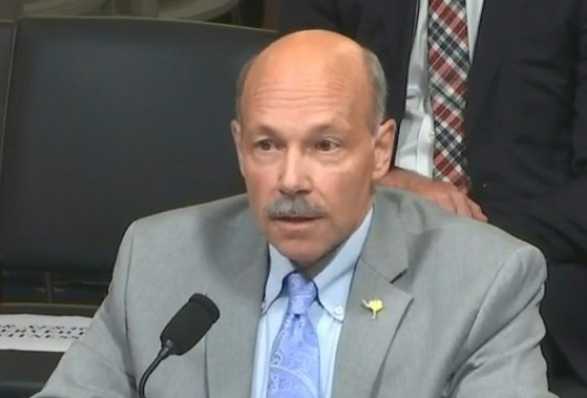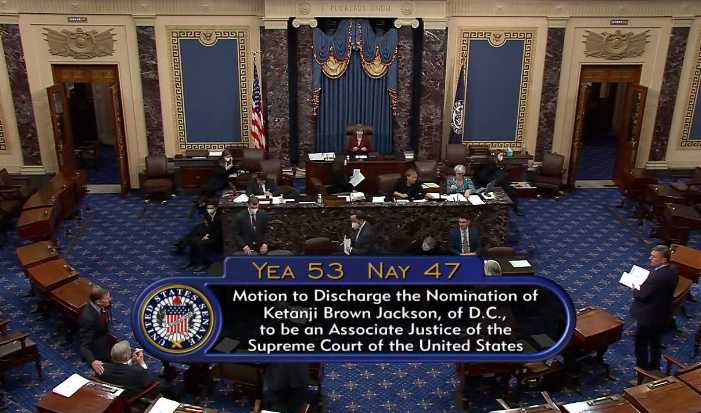Washington, DC – U.S. Senator Lisa Murkowski (R-Alaska), co-chair of the Senate Arctic Caucus, welcomed the historic confirmation of the United States’ first Ambassador-at-Large for Arctic Affairs, Dr. Michael Sfraga. Senator Murkowski was the chief advocate for the creation of the position, which the State Department initiated in 2022. The Senate confirmed Dr. Sfraga’s nomination today.
“Finally, we have officially joined the rest of the Arctic nations at the table after the Senate confirmed the United States’ first Ambassador-at-Large for Arctic Affairs. The need for this leadership in the Arctic has become even more urgent as we saw last night the fifth publicly reported incursion by Russian military aircraft in Alaska’s Air Defense Identification Zone in the last two weeks,” said Senator Murkowski. “Our new Ambassador will not only help America push back against our adversaries heightened aggression in the Arctic, but will be a critical resource in advocating for economic expansion in this increasingly vital region, committing to do everything in his power to protect American economic and security interests in the Arctic. I congratulate Dr. Michael Sfraga on his confirmation and look forward to the progress he will usher in.”
Prior to today’s vote, Senator Murkowski spoke on the Senate floor regarding the importance of confirming Dr. Sfraga. A video of her remarks can also be found here.
Read the full speech below:
“Mr. President, I have come to the Floor to speak to the nomination of Dr. Mike Sfraga, an Alaskan, to be our nation’s very first Ambassador-at-Large for Arctic Affairs.
As the person who recommended Dr. Sfraga, I’ve come to the Floor to reiterate my strong support for his nomination, and to urge the Senate to ensure we are no longer the only Arctic nation that does not have an Arctic ambassador.
I want to speak to two specific considerations: why we need to focus on the Arctic, and why Dr. Sfraga is the right person for this important role.
First, the Arctic. I won’t detail the entire history; I would just ask you to think about the past couple months alone.
On July 24, Russian and Chinese bombers flew a joint patrol for the first time off the coast of Alaska. While the Russians regularly fly into our Air Defense Identification Zone, our “ADIZ” – I don’t ever recall hearing of the Chinese flying into the area, let alone on a joint mission.
The day after Russia and China’s joint exercise, I would have told you that this escalation was the most disturbing thing we’d see this year. But unfortunately, our adversaries quickly found a way to top that – upping the ante even further.
On September 10, Russia began its massive, weeklong, worldwide Ocean-24 exercise with hundreds of warships, more than a hundred aircraft, and nearly 100,000 troops. The exercise, the largest since the fall of the Soviet Union, also saw Chinese participation. Between its start and end, NORAD and the Air Forces stationed in Alaska detected, tracked, and intercepted four different Russian incursions into the Alaska ADIZ.
In previous years, we’ve come to expect six or seven incursions a year. So think about that: in just five days, our air defenses were tested almost as much as they tend to be tested in any given year. We are now way ahead on publicly-reported intercepts this year—up to 10, with three months left.
There has also been an unprecedented level of naval activity off the coast of Alaska. During that same Russian exercise, the U.S. Coast Guard detected four Russian naval vessels 50 miles to the northwest of Point Hope in Alaska. The vessels moved to avoid sea ice in the area during their exercise—which is accepted under international law–but that brought them 50 miles into the U.S. Exclusive Economic Zone.
Hearing that, I can’t help but think back to when Russian warships chased Alaska fishermen out of an area within our EEZ back in August 2020. And these are hardly isolated incidents. Last August, the Coast Guard detected and shadowed a Russian intelligence ship operating off the Aleutians. This past July, the Coast Guard detected and shadowed a Chinese Surface Action Group within our EEZ in the Bering Sea.
I could also remind the Senate of the Chinese surveillance balloons that transited above Alaska and the Arctic last year.
I could remind the Senate of a lot more events and incidents that warrant greater attention, policy, and resources for the Arctic.
What I hope we can agree is that this an unprecedented time for the region. Normally we think of the Arctic as “High North, Low Tension.” But right now, it’s “High North, Rising Tension.” And one thing that is absolutely missing is a Senate-confirmed diplomat, who will spend his or her time focused on Arctic issues, working with our allies, and engaging our adversaries.
The United States is alone in having inadequate diplomatic representation in the Arctic. It’s not that no one at State Department is thinking about the region; it’s that no one, at a high level, is specifically tasked with and responsible for and empowered to lead the way.
So, we need an Arctic Ambassador. When we established this position in August 2022, I hoped it would mark a more serious effort to lead and maintain a rules-based order in the region. But it’s been two years, and only now are we able to confirm a highly capable, well-qualified individual to actually do that work.
Which brings me to Dr. Sfraga. He was nominated in February 2023. His nomination was favorably reported by the Foreign Relations Committee in March 2024. And today, we have the chance to confirm him.
I would contend that there is no one better suited to be the first person in this role than Dr. Sfraga. For all of the questions that some have raised about him, I would argue that we know exactly what we are getting.
Dr. Sfraga has dedicated himself to a career of service to the Arctic and our nation.
He is an accomplished geographer, researcher, and teacher, with a PhD from the University of Alaska.
He helped establish the University of the Arctic, and co-created and co-led the State Department’s Fulbright Arctic Initiative.
He established the Polar Institute at the Wilson Center, which has become the “Arctic Public Square” for high-level conversations about the Far North.
And, he Chairs the U.S. Arctic Research Commission, which advises Congress and the President on international Arctic research.
Dr. Sfraga has decades of experience, deep expertise, and strong relationships with Arctic leaders. Our allies support him, our Arctic partners support him, Alaskans support him, and I support him. He is clear-eyed about the strategic realities of the Arctic and the intentions of our adversaries. He understands how to position the United States to lead in the Arctic and to protect our national security interests. His vast experience means he knows how to handle Russia and China – across the interagency process and with allies and partners – through a position of strength.
Some have argued that Dr. Sfraga’s past interactions with regional players disqualify him from serving in this role. But remember: he’s an Alaskan. We share a maritime border with Russia. We used to have regular nonstop air service to Russia. That’s our part of the world, and when relations were better, it wasn’t uncommon for Alaskans to visit and work with and know people who lived there.
Dr. Sfraga has been criticized for attending international forums, but remember: he was hardly the only American or U.S. government official in attendance at these events. He’s just the only one being criticized for it, even though his participation helped give us a voice at those events.
I also find it fascinating that some have criticized Dr. Sfraga’s past language as advocating for a “competition-free” Arctic. I can tell you: that is how we spoke about the region for a long time. We strived to establish a rules-based order that would protect our people and maintain low tensions. Even former President Trump called for a “competition-free” Arctic.
The criticisms that Dr. Sfraga has faced are a great way to ensure that the United States never has an Arctic ambassador – or that we ultimately confirm an individual who has never been there, knows little about it, and won’t do anything to protect or advance our strategic interests.
To me, that would be a loss. The Arctic is no longer an isolated, distant region. It is a place of strategic importance, economic potential, and growing competition. The United States must be prepared to lead – and that starts with representation. Personnel is policy, and Dr. Sfraga is ready to take on this important role.
I urge the Senate to see through the attacks on Dr. Sfraga. There is nothing in his past or in his file that is disqualifying. We know exactly what we are getting; he has been a public figure, sharing his views of the Arctic, for years.
I thank those who have already offered their support for Dr. Sfraga, and would encourage the rest of my colleagues to be happy that we aren’t confirming yet another judge—but instead, a qualified Alaskan who can lead on Arctic matters from day one, at a time when that matters more than it has in decades.
I urge all of my colleagues to join me in voting yes to confirm Dr. Sfraga and yield the Floor.”
Background: Senator Murkowski is an internationally recognized leader on Arctic issues and is dedicated to strengthening America’s position as an Arctic nation. In October 2021, she and Senator Angus King (I-ME) introduced the Arctic Diplomacy Act to establish an Assistant Secretary of State for Arctic Affairs.
Following Senator Murkowski’s persistent advocacy, the State Department announced in August 2022 that “the President plans to elevate the Arctic Coordinator position by appointing an Ambassador-at-Large for the Arctic Region, subject to the advice and consent of the Senate. The Ambassador-at-Large for the Arctic Region will advance U.S. policy in the Arctic, engage with counterparts in Arctic and non-Arctic nations as well as Indigenous groups, and work closely with domestic stakeholders, including state, local, and Tribal governments, businesses, academic institutions, non-profit organizations, other federal government agencies and Congress.”
Dr. Mike Sfraga is the first nominee for the new Ambassador-At-Large position. His official biography from the U.S. Arctic Research Commission appears below.
“Dr. Michael Sfraga was the founding director of the Polar Institute and served as the director of the Global Risk and Resilience Program at the Woodrow Wilson International Center for Scholars in Washington, DC. He currently serves as chair and distinguished fellow in the Polar Institute, where his scholarship and public speaking focus on Arctic policy.
“An Alaskan and a geographer by training, his work focuses on the changing geography of the Arctic and Antarctic landscapes, Arctic policy, and the impacts and implications of a changing climate on political, social, economic, environmental, and security regimes in the Arctic.
“Sfraga served as distinguished co-lead scholar for the U.S. Department of State’s inaugural Fulbright Arctic Initiative from 2015 to 2017, a complementary program to the U.S. Chairmanship of the Arctic Council; he held the same position from 2017 to 2019. He served as chair of the 2020 Committee of Visitors Review of the Section for Arctic Science (ARC), Office of Polar Programs, National Science Foundation, and currently serves on the Scientific Advisory Council of the Finnish Institute for International Affairs. Sfraga previously served in several academic, administrative, and executive positions at the University of Alaska, including vice chancellor, associate vice president, faculty member, department chair, and associate dean. Sfraga earned the first PhD in geography and northern studies from the University of Alaska Fairbanks.”
###[content id=”79272″]








